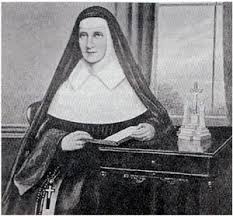Archives record decisions, actions and memories. Archives are a unique and irreplaceable heritage passed from one generation to another. Archives are managed from creation to preserve their value and meaning. They are authoritative sources of information underpinning accountable and transparent administrative actions. They play an essential role in the development of societies by safeguarding and contributing to individual and community memory. (Extract from the Universal Declaration on Archives as issued by the International Council on Archives 2010)
All within the Mercy Congregation share collective responsibility for the management of archives and the safeguarding of community memory: the individual member by sharing her life story in an oral interview or by preserving her personal papers; the annalist by recording the story of her community; the administrators and decision makers by supporting the creation and proper management of records within their purview; the community, provincial and congregational archivists by selecting, maintaining and making these records available for use.
In selecting records for preservation archivists are guided by the extent of their evidential value by which the records provide evidence of the origins, structure, functions, policies and operations of the person or body that created them. The vast bulk of the records in our archives have an evidential value, be it the financial value as recorded in account books, the legal value in property records or the administrative value in community minutes.
However, sometimes we acquire a record or item that does not exhibit any evidential value but is prized because of the historical value that arises from its exceptional age and/or association with some historical event or person. Such an event occurred on 18th November, 2010 when Mercy Congregational Archives received a small and rather battered tin deed box, with the words Catherine McAuley stenciled on the outside.
The box was empty, but with consideration of its provenance comes the realization that what once served to store the legal and financial records associated with Catherine now serves as a physical link to the foundress and a storehouse of memory for the congregation.
The box had been in the possession of the law firm Arthur O’Hagan, whose founder, Arthur O’Hagan, was a partner of Catherine McAuley’s friend and legal adviser, Charles Cavanagh.
Charles Cavanagh was a solicitor who acted as Catherine McAuley’s Legal Advisor and Accountant, assisting with both her legal and financial affairs. Mary Sullivan makes reference to his constant and generous solicitude towards the Sisters of Mercy during Catherine’s life and long afterwards and this is evidenced by the £20 he lent Catherine in December 1835 to tide her over a temporary shortfall of funds. (Sullivan, The Correspondence of Catherine McAuley p. 71). This was no mean sum and probably the equivalent of £16,600 sterling in today’s world. (calculation from EH.Net using average earnings).
Eleven of Catherine’s letters to Cavanagh are still extant and date from 1835 to 1841. Indeed her last two recorded letters are to Cavanagh in October 1841 asking him to consult his partner Arthur O’Hagan regarding twenty pounds bequeathed to her by the late Widow Ryan and to secure said sum from Mr Boylan a solicitor appointed to make the payment.
A notation by Cavanagh on Catherine’s final letter reads “Mr Boylan paid the money to the convent 26th October, 1841.”
Cavanagh also attended Catherine on the morning of 11th November 1841 and with O’Hagan witnessed the signing of the codicil of her will. She died that evening.
After Catherine’s death Cavanagh continued his association with the Sisters of Mercy and Mother Vincent Whitty, commenting on his death in a letter from All Hallows, Brisbane to the Baggot Street Superior, Mother Mary of Mercy Norris on 17th February, 1864, noted, “you must indeed miss him sadly. I feel so pained when I think of his death…Mr Cavanagh’s bell is not put up on this house yet, but we have got £15 towards the erection of a belfry… all the prayers we could procure for him would never repay his kindness to Baggot Street. How pleased poor Mother McAuley would be to see him in the next world. For I never can forget the joy of their countenances in olden times when trying to arrange for and speaking over their most difficult circumstances and experiences”.
O’Hagan continued to serve as solicitor to the Convent of Mercy in Baggot Street. He formed the law firm of Arthur O’Hagan in 1852 and this firm acted for the Dublin Sisters of Mercy until 1994 and for the South Central Province from 1994 to 2008 when Arthur O’Hagan Solicitors merged with Mason Hayes Curran Solicitors.
We are grateful to Arthur O’Hagan Solicitors for preserving this unique and irreplaceable part of the heritage of the Sisters of Mercy and to Paul McDonald of Mason Hayes Curran Solicitors for depositing the little deed box in Mercy Congregational Archives on 18th November 2010.
Marianne Cosgrave
Mercy Congregational Archivist




